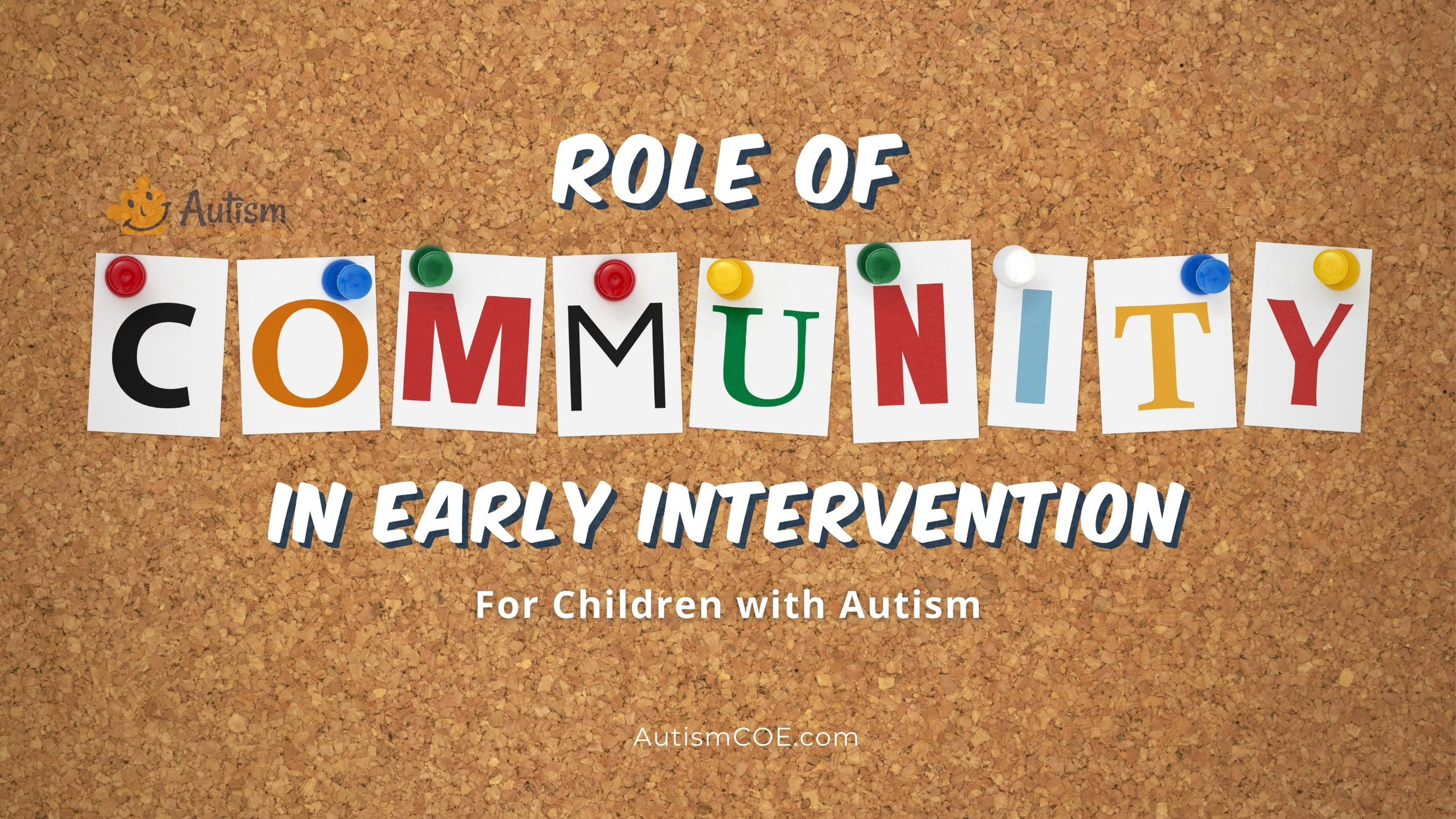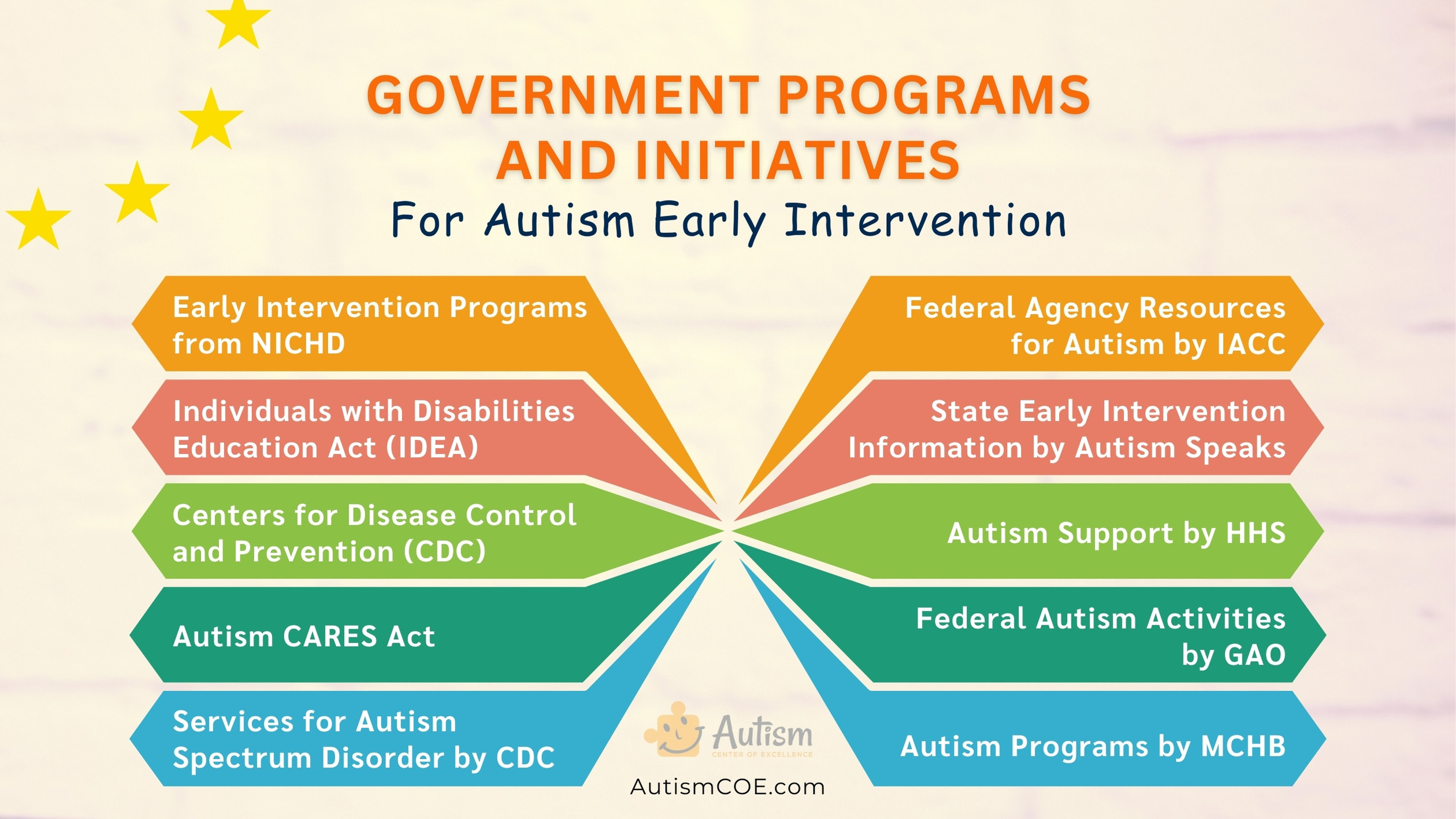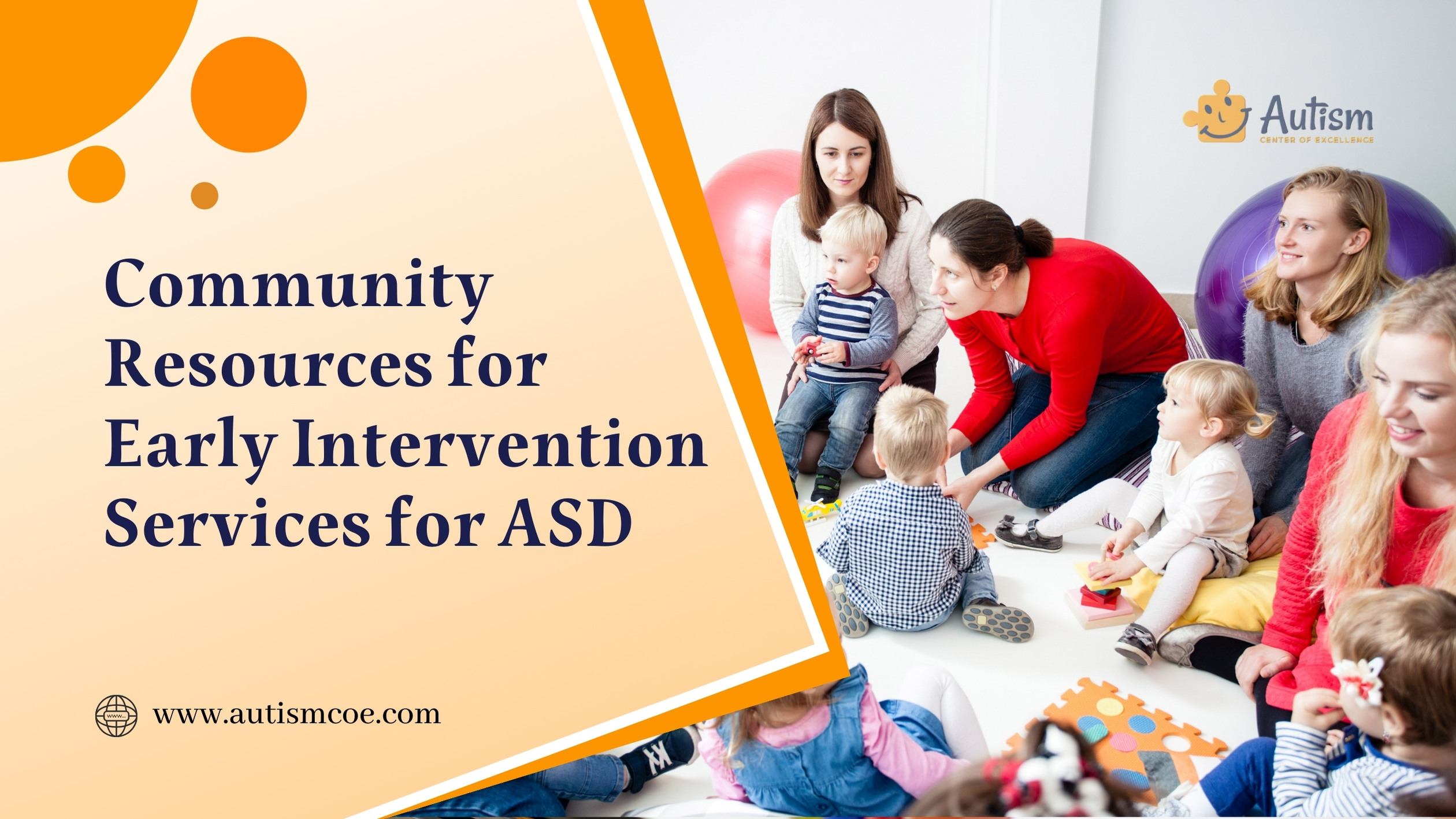Community supports for Early Intervention Services for Autism Spectrum Disorder (ASD) are varied programs and efforts that are targeted to help children diagnosed with ASD. Most of these resources are localized to answer community needs and are intended for the improvement of the developmental milestones of these kids through timely intervention. They cover a variety of services, addressing, but not limited to, therapeutic interventions, educational support, family counseling, and health services.
State-run Early Intervention Programs, autism research centers at universities, and other community resources such as sensory-friendly recreation options also exist. Such resources are usually the result of joint work between medical workers, educators, social workers, and therapists, who strive to offer all-round Support to Autistic Children and their families.
What is Community-Based Early Intervention?
Community-based early intervention is a group of services aimed to help children having developmental delays or disabilities like Autism Spectrum Disorder (ASD) and their families. Typically, these services are available in natural settings for the child, such as their home, daycare, or local community centers. The principle purpose of the community-based early intervention is to detect and eliminate potential Developmental Problems at the earliest stage and thus, boost the child’s capacity to integrate and strive in their community.
A distinctive feature of community-based early interventions lies in the concentration on the child’s natural settings but not on the isolated clinical settings. This method provides a holistic view, which includes the child’s life with their friends, family members, and other important situations through which a child’s life goes. When services are embedded within the community children can generalize skills across settings and situations. Besides, it creates a community spirit of inclusion, where the children with ASD are understood and accepted along with other development disorders’ children.

Role of Community in Early Intervention
Communities can play a significant role in early intervention. They provide an environment where children with ASD can learn and grow.
Promoting Inclusion
The communities are an important element that helps create an environment of tolerance and integration for children with ASD. Through awareness and understanding, communities can provide platforms where these children can also play with other people, and in the end, their Social Skills are improved.
Providing Resources
Community local resources that include libraries, parks, and recreational centers provide learning and development stimulating environments. These spaces provide diverse activities that not only satisfy the child’s tastes but also help in their development.
Connecting Families
Communities are a web that links families with similar difficulties. Support groups, Parent Training Programs, and social events will provide families with the chance to learn from each other’s experiences, as well as, Gain Emotional Support and reduce feelings of isolation.
Enabling Access to Services
The community can support access to early intervention services by offering services at community centers or through home-based services. This accessibility can dramatically affect the child’s development since early and consistent intervention is critical for ASD children.
Advocacy
Communities can lobby for policies and ways of management that promote Early Intervention Strategies. This action can result in better funding, enhanced services, and better ways of helping children with ASD and their families.
Collaboration with Professionals
Most communities work with professionals such as ABA Therapists, special educators, and medical practitioners. This partnership guarantees an interdisciplinary approach to early intervention and pooled expertise from different fields.
Building Resilience
By sharing experiences, supportive relationships, and available resources, communities can assist in developing resilience in families of children with ASD. Such strength of character can enable families to deal with the difficulties related to the disorder in a more positive way.
Join Our Weekly Newsletters!
Subscribe now to stay updated with our latest email updates.
Local Community Resources for ASD
Based on the information available from various sources, here are some communities that provide early intervention services for children with Autism Spectrum Disorder (ASD) in North Carolina and Virginia:
In North Carolina
💥 Easterseals UCP North Carolina:
Offers early intervention programs for babies and toddlers who have been diagnosed with Developmental Delays and disabilities. Services provided include Speech Therapy, Occupational Therapy, gross motor therapy, and special instruction. They also offer family assistance by way of counseling and training.
🌐 https://eastersealsucp.com/
💥 Autism Society of North Carolina
This offers Autism Resource Specialists who can guide through early intervention, school, community, and adult services. In addition, they provide family support groups, educational workshops, and recreational programs.
🌐 https://www.autismsociety-nc.org
💥 Autism Strong
This is an internet platform committed to supporting and providing resources for autism families. A non-profit organization that focuses on education, advocacy, and support to empower and strengthen families affected by autism. The website provides a variety of resources such as learning materials, support groups, and details on autism related activities. This association is a proponent of the power of unity and tries to build a strong linkage among people with autism.
🌐 https://autismstrong.org/
💥 The Arc of the Triangle
A North Carolina-based non-profit organization. They help children and adults with intellectual and/or developmental disabilities (I/DD) in realizing their goals and dreams in the community through partnership and advocacy.
🌐 https://www.arctriangle.org/
💥NCDHHS
The North Carolina Department of Health and Human Services is committed to providing detailed information about special needs resources for children state-wide. This website is especially helpful for Early Intervention in Autism Spectrum Disorder (ASD) as it provides useful contacts for early intervention services, exceptional children programs in public schools, and local interagency coordinating councils. These resources are crucial in aiding families and children with ASD, thus, it is a useful instrument in their journey.
🌐 https://ncchildcare.ncdhhs.gov/Parent/Special-Needs/Special-Needs-Resources
In Virginia
💥 Virginia Autism Resource Center (VARC)
A resource center that serves the entire state and is focused on enhancing the quality of life of persons with ASD and their families. VARC serves families, educators, and professionals with information, resources, and support. They also provide training and workshops on different areas concerning autism.
🌐 https://vcuautismcenter.org/about/projects/varc.cfm
💥 The Virginia Association of Community Services Boards (VACSB)
Community based support will be the core support services provided by the organization for individuals who require behavioral health and developmental disability services, which may include ASD. They do advocacy and public policy, give resources, and hold conferences and training.
🌐 https://vacsb.org/
💥 Autism Society Central Virginia (ASCV)
ASCV is one local affiliate of the National Autism Society which has been providing non-profit services, advocacy, and support to children, youth, and adults with autism, their families, and the professionals who serve them for over 40 years.
🌐 https://ascv.org/
💥 Autism Speaks
Its main goal is to create a better tomorrow for the sufferers of Autism Spectrum Disorders. It provides financial aid for International Biomedical Research aimed at the identification, control, treatment and potential cure for autism. Autism Speaks does all it can in order to improve public awareness of autism and its impact on individuals, families, and the whole society. However, they target giving hope to all suffering from the difficulties of this disorder.
🌐 https://www.autismspeaks.org/
💥 U.S. Department of Health & Human Services
It is a rich reservoir of materials on child health and development, including those required for early intervention in autism. Even though the details of ASD early interventions aren’t directly provided, the website acts as an essential entry point for further resources and Information About Early Support and Intervention for Children with Autism. As a result, this can be very helpful to parents, caregivers, and professionals looking for help in this area.
🌐 https://www.acf.hhs.gov/ecd/child-health-development/watch-me-thrive/resources

Government Programs and Initiatives
For Early Intervention for Children with Autism
Government programs and initiatives are crucial in the provision of the early intervention of children with Autism Spectrum Disorder (ASD). These activities include financing research, as well as offering personal care to the families. Here are some key government initiatives:
1️⃣ Early Intervention Program from NICHD
The National Institute of Child Health and Human Development funds early intervention programs that allow children to acquire basic skills that are usually learned during the first two years of a child’s life, such as gross motor skills. These programs are family-centered and may have speech therapy, occupational therapy, and other services.
2️⃣ Individuals with Disabilities Education Act (IDEA)
The federal law demands that public schools must deliver free and suitable education to children with disabilities including ASD. As provided by IDEA, Part C program of the Individuals with Disabilities Education Act (IDEA), early intervention services are offered to children from birth to three years of age. Children with ASD after three years of age will be able to participate in the special education program under IDEA Part B.
3️⃣ Centers for Disease Control and Prevention (CDC)
CDC funds research into what causes and how widespread ASD is and provides resources for families and healthcare providers. They also help to increase knowledge of Early Signs of ASD, and the necessity of early interventions.
4️⃣ Autism CARES Act:
The Autism Collaboration, Accountability, Research, Education, and Support (CARES) Act was approved in 2014 with the aim of increasing government support for children with ASD. This move funds research, healthcare professionals and educators training, and family support programs.
5️⃣ Services for Autism Spectrum Disorder by the CDC
The Centers for Disease Control and Prevention highlights early intervention services that help children from birth to 3 years old learn crucial skills, including therapy to help the child talk, walk, and interact.
6️⃣ Federal Agency Resources for Autism by IACC
The Interagency Autism Coordinating Committee offers tools for the health and social welfare of children, families, individuals, and communities. All of this also incorporates efforts related to Autism Awareness and Acceptance in Early Childhood Education.
7️⃣ State Early Intervention Information by Autism Speaks
On the other hand, Autism Speaks offers a detailed list of state-specific early intervention programs. It is a very useful tool for localized support for families.
8️⃣ Autism Support by HHS
The Department of Health and Human Services sponsors research on models of coordination for ASD identification and early intervention services for children.
9️⃣ Federal Autism Activities by GAO
According to the U.S. Government Accountability Office, federal agencies have implemented different measures to promote early autism Identification and Interventions.
🔟 Autism Programs by MCHB
The Maternal and Child Health Bureau of the Health Resources and Services Administration aims at training the healthcare workforce to screen, refer, and provide services for children and youth with ASD.
These actions highlight the government’s dedication to ensuring early intervention services for these children, thus allowing them to achieve their maximal performance.
How to Utilize Community Resources for Early Intervention
To utilize community resources effectively, you should:
- Realize the particular demands of your child.
- Find out what resources your community has.
- Contact these organizations. Participate in support groups, either online or face-to-face.
- Work with experts to design an individualized intervention plan for your child.
- Continuously review how well the intervention is working and make modifications as required.
Frequently Asked Questions & Answer
What is an Organization that Helps People with Autism?
Many organizations are focused on the assistance of autistic people and their families. Such as the Asperger/Autism Network (AANE) that provides support to people with autism spectrum and their families and professionals to help them gain connected and purposeful lives. Areas such as advocacy and research are considered by the National Autism Association to help families and autistic individuals. Autism Speaks also advocates for an answer to the requirements of individuals with autism as well as their families throughout the spectrum and their lifetime.
What is the Most Common Intervention for Autism?
Several current interventions for autism include parent training, social stories, and Applied Behavior Analysis (ABA). ABA is a behavior modification program that targets advancements in particular behaviors, including social skills, communication, and academic functioning, along with adaptive learning skills, such as fine motor control, hygiene, grooming, home living skills, punctuality, and job performance.
What Types of Community Resources are Available for Early Intervention Services for ASD?
A variety of community resources are ready to support early intervention for ASD. Therapies – Speech and occupational therapists, special education programs – autism support groups, programs for social skill training, and the like. Moreover, online resources such as AutismCOE also offer some information discussing autism therapy, whereby parents and caregivers may obtain knowledge and guidance to keep them updated.
How Can I Access These Community Resources for Early Intervention Services for ASD?
Usually accessing these resources starts with a reference from a pediatrician or other healthcare provider. You can also contact local as well as online platforms designed for autism support. Research and stay informed of the resources available in your community to create an individualized intervention plan that meets your child’s unique needs.
Conclusion
Community resources are very important in the early intervention of ASD. With these resources, parents, caregivers, and educators can give children with ASD the support and guidance they need to achieve their full potential. Researching and being aware of the resources that are present in your community are very critical factors for creating a Personalized Intervention Plan that matches the specific needs of your child.
Remember that, you are not alone in this journey. There are friendly communities ready to help you and your child. At AutismCOE, we are the place where you can find not only various therapies but also experiences and information on autism treatments. Keep in touch and updated with us and hang on to your hope that a better tomorrow is possible for your child. Therefore, go on exploring and use the resources that are available to you! Collectively, we will be able to produce a positive influence on children with ASD.
Please Note: The content of this blog is for informational purposes only and should not be considered a substitute for professional medical advice, diagnosis, or treatment. Consult a qualified healthcare professional for personalized guidance tailored to your specific situation.

Bhavika Bhasin
Bhavika Bhasin is the Research and Marketing officer at AutismCOE. She works with children and adults with ASD. Her clinical research includes evaluating various available autism screening and diagnosis methods and their efficacy. She is currently developing a novel screening exam that is indicated to be more accurate than the existing available exams. She is also writes articles papers for various publications.


